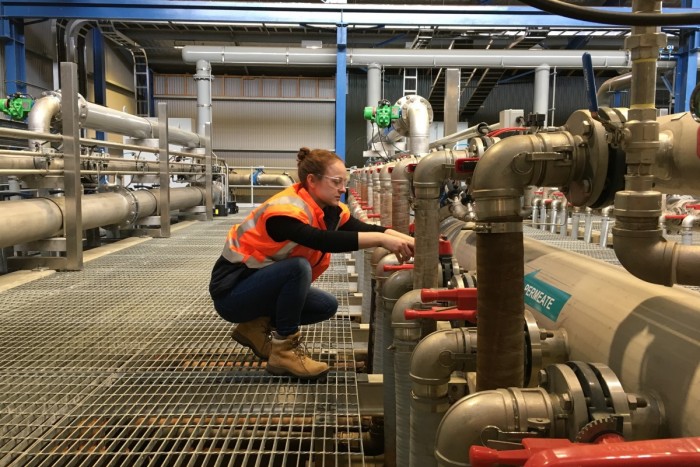Water/Wastewater Treatment Operator
Kaiwhakamahi Whakapai Wai (Paru)
Alternative titles for this job
Water/wastewater treatment operators run water and wastewater treatment plants. They treat water so that it is acceptable to drink. They also control the disposal of sewage and industrial wastewater.
Pay
Water/wastewater treatment operators with up to two years' experience usually earn
$49K-$70K per year
Water/wastewater treatment operators with two or more years' experience usually earn
$50K-$130K per year
Source: Connexis, 2018.
Job opportunities
Pay
Pay for water/wastewater treatment operators varies depending on skills, experience and the size of the organisation they work for.
- Water/wastewater treatment operators with up to two years' experience can earn between $49,000 and $70,000 a year.
- Water/wastewater treatment operators with two to 10 years' experience usually earn between $50,000 and $110,000.
- Water/wastewater treatment operators who work as team leaders or managers usually earn between $70,000 and $130,000.
Source: Connexis, 2018.
- PAYE.co.nz website - use this calculator to convert pay and salary information
- Employment New Zealand website - minimum wage rates
(This information is a guide only. Find out more about the sources of our pay information)
What you will do
Water/wastewater treatment operators may do some or all of the following:
- monitor the water treatment process and make adjustments
- collect, analyse and interpret water or wastewater samples
- maintain, operate, repair and replace water or wastewater treatment equipment as necessary
- maintain treatment plant grounds and buildings
- check treatment chemical supplies and order new supplies as required
- write reports and logs.
Skills and knowledge
Water/waste water treatment operators need to have:
- knowledge of water or wastewater treatment processes
- understanding of how water or wastewater treatment equipment operates, including how pumps work
- understanding of how to take equipment apart and put it back together
- knowledge of the basic chemistry of water, and of chemicals used to treat water
- knowledge of drinking water standards and regulations.
Working conditions
Water/wastewater treatment operators:
- usually work regular business hours, but may also work weekends and be on call
- work inside and outside at water or wastewater treatment plants
- work in most weather conditions and in conditions that may be noisy and smelly
- may travel locally between treatment plants to monitor and maintain them.
What's the job really like?

Ryan Young
Water Treatment Plant Specialist
What do water treatment operators do?
"It's a job where you're dealing with lots of different types of scientific instruments and meters.
"Drinking water standards are constantly monitored. You've got pH [acid and alkaline] and chlorine levels, conductivity [electrical flow in water], turbidity [cloudiness of the water], and UV [ultraviolet levels] to monitor. There are lots of machines with working parts that you need to keep clean, safe and working.
"Any change can be quite catastrophic when it comes to the drinking water of a town. You need to be very reliable."
What challenges do you face?
"Things can change very quickly in the water industry. Even just a little bit of rain can change the pH or turbidity in the river. You need to have your finger on the pulse to know what's coming. You need to make sure that your plant is ready for a storm.
"When the river has less water in it, you have elevated temperatures, which change the way the chemicals react with it. You're more likely to get bugs or bacteria when the river is hot and low. You need to be able to deal with all of those things."
What's rewarding about being a water treatment operator?
"Water is such a basic necessity. Making sure that water just comes out of people's taps is rewarding.
"I was recently asked to make sure that our line plant was operating properly. That involved pulling apart a pump that no one had yet pulled apart properly, and basically just finding out how it worked and getting it all fixed and getting replacement parts. Things like that are rewarding."
Wastewater treatment operator video
I've been with Watercare for 12 years now. I started with Watercare labs, and from there moved over to the Mangere Wastewater Treatment Plant. Worked on shift, from there worked my way up progressing into a process engineer. Finally I've been working as an operations controller for the last three years.
I'm responsible for looking after eight of the non-metropolitan wastewater treatment plants in the greater South Auckland area. Those eight wastewater treatment plants service around about 50,000 people. These people and the environment are the number one priority for the southern wastewater team.
I arrive at the treatment plant at around about 7.30 in the morning. From there I will be looking at the different monitoring systems we have to check the status of the plants, and then be ringing the guys and speaking to my different process technicians, and checking on any issues that may have occurred the night before, and ensuring that any problems can be resolved.
I'm also looking at the efficiency of our plants, checking chemical usage for optimisation as it is public money we're using, so we have to use that money wisely.
A couple of times a week I'll go meet face to face with my process technicians to have a one on one, find out how they're going, how the plants are running. Health and safety are always my first items on the agenda. We carry out regular inspections and look at the operation of plants to ensure operational efficiency and safety.
I enjoy mentoring because I like being able to pass on some of the knowledge I've got and see the guys growing and see the excitement they get from learning something new and being able to then carry out that and feel more empowered themselves.
One of the biggest challenges in my role is to bring the legacy plants we inherited from the former district councils up to a standard which will treat the wastewater to a higher quality.
In many of the areas in the greater South Auckland area the population is increasing at a dramatic rate – especially with the special housing areas that have been noted in Pokeno and Pukekohe – so we have to work closely with planning as some of the plants we already have now are reaching near the end of their capacity, and without working with planning we need to be able to start looking at the improvements and expansions required to keep up with growth in the area.
We rely heavily on the maintenance services team as they are critical to our operation. Without the help from the mechanical, electrical and instrumentation department the facilities would not be able to run smooth as they do.
We meet regularly with the Auckland Council consent compliance officer. We do this to ensure we keep open dialogue with the Auckland Council and to ensure that we keep them abreast of what is happening at the treatment plants.
When we do meet, we discuss the plant performance and how the plant is doing. We also look at and inform the council of any upgrades we may be doing, issues we may be experiencing and what we're going to do to resolve those problems.
The thing I love about my job is I'm doing my part to protect the environment in this lovely country we live in.
Watercare has given me a great variety of work opportunities and many challenges with a lot of support to go with that – all helping you move through your career progression into areas that sometimes you'd never thought you would go into before.
The people at Mangere are a great bunch of people. They're really a fun bunch to work with and there's lots of support and aroha. I'm Jonathan Piggot, and I'm the wastewater operations controller in the southern area of Watercare.
Entry requirements
To become a water/wastewater treatment operator you need to complete an apprenticeship and gain a New Zealand Certificate in Water Treatment (Level 4).
Connexis oversees apprenticeships and on-the-job training.
- Connexis website - information about water treatment qualifications
- More information about apprenticeships
Additional requirements preferred by some employers
Besides the New Zealand Certificate in Water Treatment, some employers prefer you to have one of the following:
- A degree in science or engineering.
- A trade qualification in fitting and turning or electrical work.
Secondary education
No specific secondary education is required for this job. However, biology, chemistry, construction and mechanical technologies, and maths are useful.
Personal requirements
Water/wastewater treatment operators need to be:
- mature, responsible and safety-conscious
- reliable, punctual and motivated
- practical and adaptable
- problem solvers
- good at basic maths.
This is a job for someone who’s adaptable and who likes turning up for work in the morning not knowing exactly what they're going to be dealing with.

Ryan Young
Water Treatment Plant Specialist
Useful experience
Useful experience for water/wastewater treatment operators includes laboratory work and work in a trade such as:
- plumbing
- engineering
- electrical
- maintenance diagnostics
- electronics.
Physical requirements
Water/wastewater treatment operators need to be reasonably fit as they have to walk around large treatment plants.
Find out more about training
- Connexis NZ
- 0800 486 626 - askus@connexis.org.nz - www.connexis.org.nz
- Water New Zealand
- 04 472 8925 - enquiries@waternz.org.nz - www.waternz.org.nz
What are the chances of getting a job?
Water/wastewater treatment operators in demand
Although the number of water/wastewater treatment operators has been rising, employers report there are still not enough workers to meet demand. This is due to:
- many water/wastewater treatment operators reaching retirement age
- not enough trainees coming through to replace those leaving the role
- changes to environmental and safety legislation for water and wastewater standards, creating more vacancies for workers
- investment in upgrading water/wastewater treatment plants, creating a need for skilled workers.
According to the Census, 897 water/wastewater treatment workers worked in New Zealand in 2018.
Types of employers varied
Water/wastewater treatment operators work for:
- councils
- contractors
- district health boards
- engineering consultants
- dairy and meat processing factories.
Sources
- Bassett, D, Kāpiti Coast District Council water and wastewater treatment plants manager, careers.govt.nz interview, December 2018.
- Harris, D, 'New Regulations in the Pipeline as Government Unveils Road Map for Three Waters Overhaul', 20 November 2018, (www.stuff.co.nz).
- Hewer-Hewitt, N, Water Industry Operations Group chair, careers.govt.nz interview, February 2019.
- Infometrics, 'Water Sector Report', December 2018.
- Lepla, R, 'New Range of Initiatives Target Increased Demand', 9 February 2018, (www.localgovernmentmag.co.nz).
- McEnaney, V, sector engagement manager, Water New Zealand, careers.govt.nz interview, January 2019.
- Stats NZ, '2018 Census Data', 2019.
- Yeates, A, waste industry manager, Connexis, careers.govt.nz interview, December 2018.
(This information is a guide only. Find out more about the sources of our job opportunities information)
Progression and specialisations
Water/wastewater treatment operators may move into supervisory or managerial roles with further training.
Water/wastewater treatment operators specialise as either:
- Water treatment plant operators
- Water treatment plant operators treat water to be used for household consumption.
- Wastewater treatment plant operators
- Wastewater treatment plant operators treat and oversee the disposal of waste water.
Last updated 25 March 2025


